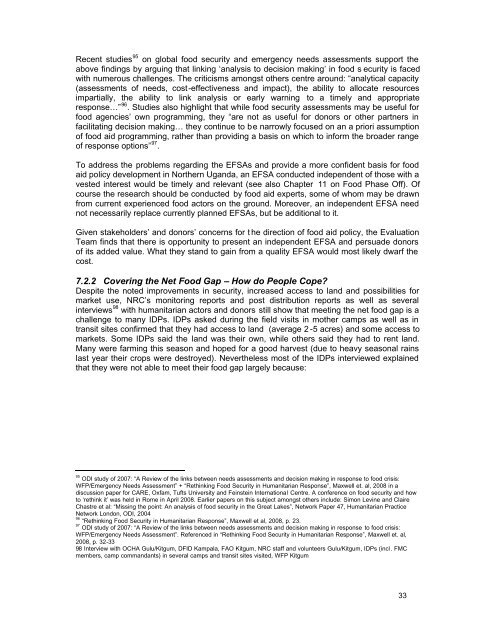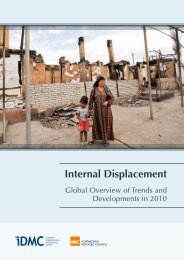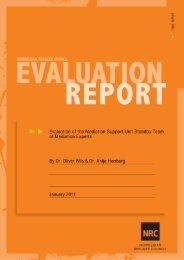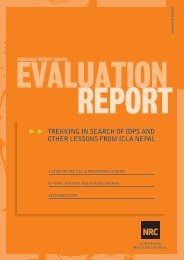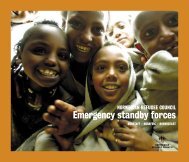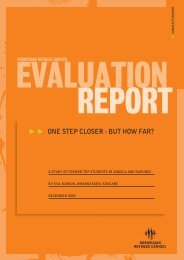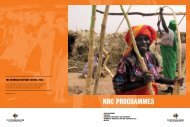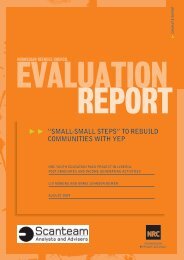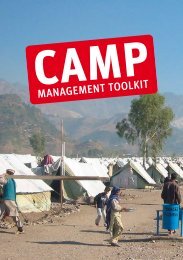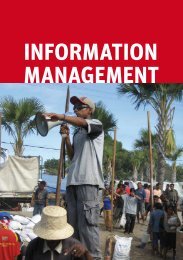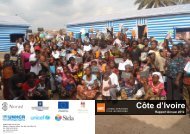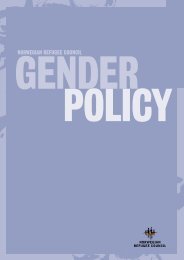evaluation of general food distribution in northern uganda: gulu ...
evaluation of general food distribution in northern uganda: gulu ...
evaluation of general food distribution in northern uganda: gulu ...
Create successful ePaper yourself
Turn your PDF publications into a flip-book with our unique Google optimized e-Paper software.
Recent studies 95 on global <strong>food</strong> security and emergency needs assessments support theabove f<strong>in</strong>d<strong>in</strong>gs by argu<strong>in</strong>g that l<strong>in</strong>k<strong>in</strong>g ‘analysis to decision mak<strong>in</strong>g’ <strong>in</strong> <strong>food</strong> s ecurity is facedwith numerous challenges. The criticisms amongst others centre around: “analytical capacity(assessments <strong>of</strong> needs, cost-effectiveness and impact), the ability to allocate resourcesimpartially, the ability to l<strong>in</strong>k analysis or early warn<strong>in</strong>g to a timely and appropriateresponse…” 96 . Studies also highlight that while <strong>food</strong> security assessments may be useful for<strong>food</strong> agencies’ own programm<strong>in</strong>g, they “are not as useful for donors or other partners <strong>in</strong>facilitat<strong>in</strong>g decision mak<strong>in</strong>g… they cont<strong>in</strong>ue to be narrowly focused on an a priori assumption<strong>of</strong> <strong>food</strong> aid programm<strong>in</strong>g, rather than provid<strong>in</strong>g a basis on which to <strong>in</strong>form the broader range<strong>of</strong> response options” 97 .To address the problems regard<strong>in</strong>g the EFSAs and provide a more confident basis for <strong>food</strong>aid policy development <strong>in</strong> Northern Uganda, an EFSA conducted <strong>in</strong>dependent <strong>of</strong> those with avested <strong>in</strong>terest would be timely and relevant (see also Chapter 11 on Food Phase Off). Ofcourse the research should be conducted by <strong>food</strong> aid experts, some <strong>of</strong> whom may be drawnfrom current experienced <strong>food</strong> actors on the ground. Moreover, an <strong>in</strong>dependent EFSA neednot necessarily replace currently planned EFSAs, but be additional to it.Given stakeholders’ and donors’ concerns for t he direction <strong>of</strong> <strong>food</strong> aid policy, the EvaluationTeam f<strong>in</strong>ds that there is opportunity to present an <strong>in</strong>dependent EFSA and persuade donors<strong>of</strong> its added value. What they stand to ga<strong>in</strong> from a quality EFSA would most likely dwarf thecost.7.2.2 Cover<strong>in</strong>g the Net Food Gap – How do People Cope?Despite the noted improvements <strong>in</strong> security, <strong>in</strong>creased access to land and possibilities formarket use, NRC’s monitor<strong>in</strong>g reports and post <strong>distribution</strong> reports as well as several<strong>in</strong>terviews 98 with humanitarian actors and donors still show that meet<strong>in</strong>g the net <strong>food</strong> gap is achallenge to many IDPs. IDPs asked dur<strong>in</strong>g the field visits <strong>in</strong> mother camps as well as <strong>in</strong>transit sites confirmed that they had access to land (average 2 -5 acres) and some access tomarkets. Some IDPs said the land was their own, while others said they had to rent land.Many were farm<strong>in</strong>g this season and hoped for a good harvest (due to heavy seasonal ra<strong>in</strong>slast year their crops were destroyed). Nevertheless most <strong>of</strong> the IDPs <strong>in</strong>terviewed expla<strong>in</strong>edthat they were not able to meet their <strong>food</strong> gap largely because:95ODI study <strong>of</strong> 2007: “A Review <strong>of</strong> the l<strong>in</strong>ks between needs assessments and decision mak<strong>in</strong>g <strong>in</strong> response to <strong>food</strong> crisis:WFP/Emergency Needs Assessment” + “Reth<strong>in</strong>k<strong>in</strong>g Food Security <strong>in</strong> Humanitarian Response”, Maxwell et. al, 2008 <strong>in</strong> adiscussion paper for CARE, Oxfam, Tufts University and Fe<strong>in</strong>ste<strong>in</strong> International Centre. A conference on <strong>food</strong> security and howto ‘reth<strong>in</strong>k it’ was held <strong>in</strong> Rome <strong>in</strong> April 2008. Earlier papers on this subject amongst others <strong>in</strong>clude: Simon Lev<strong>in</strong>e and ClaireChastre et al: “Miss<strong>in</strong>g the po<strong>in</strong>t: An analysis <strong>of</strong> <strong>food</strong> security <strong>in</strong> the Great Lakes”, Network Paper 47, Humanitarian PracticeNetwork London, ODI, 200496“Reth<strong>in</strong>k<strong>in</strong>g Food Security <strong>in</strong> Humanitarian Response”, Maxwell et al, 2008, p. 23.97ODI study <strong>of</strong> 2007: “A Review <strong>of</strong> the l<strong>in</strong>ks between needs assessments and decision mak<strong>in</strong>g <strong>in</strong> response to <strong>food</strong> crisis:WFP/Emergency Needs Assessment”. Referenced <strong>in</strong> “Reth<strong>in</strong>k<strong>in</strong>g Food Security <strong>in</strong> Humanitarian Response”, Maxwell et. al,2008, p. 32-3398 Interview with OCHA Gulu/Kitgum, DFID Kampala, FAO Kitgum, NRC staff and volunteers Gulu/Kitgum, IDPs (<strong>in</strong>cl. FMCmembers, camp commandants) <strong>in</strong> several camps and transit sites visited, WFP Kitgum33


